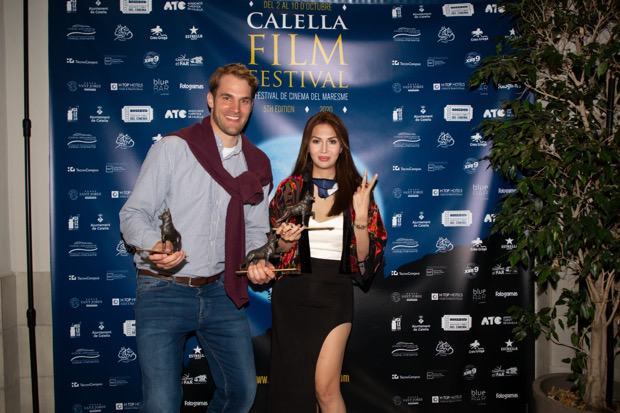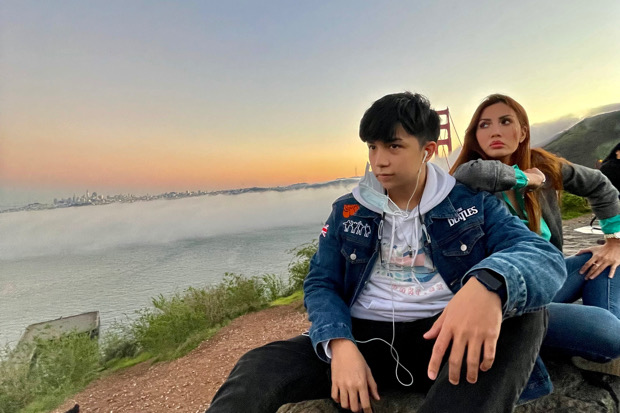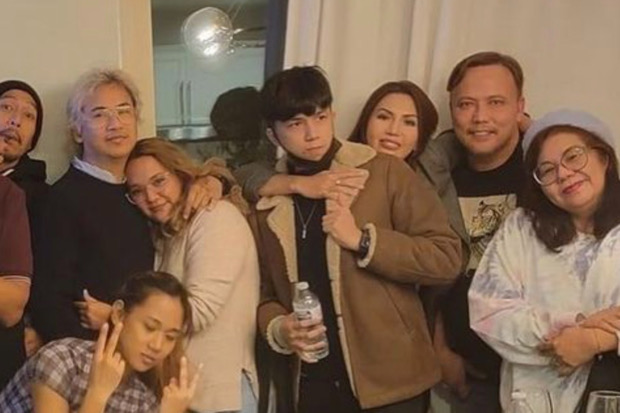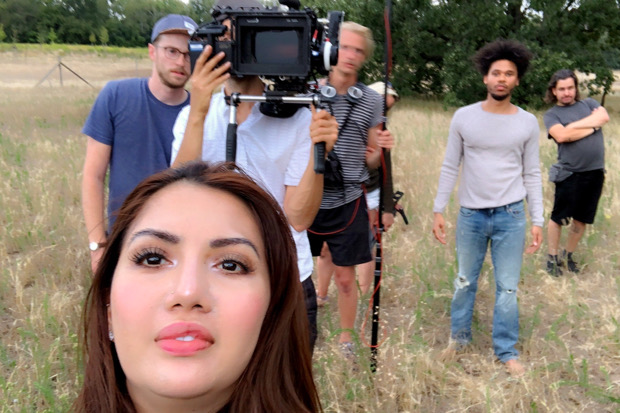Passionate perseverance: ‘Deine Farbe’ director Maria Diane Ventura’s path to her ‘first love’

Maria Diane Ventura
“People assume it was confidence, but I just simply was compelled to move towards what I felt so powerfully to go after.”
These are the words of Filipino filmmaker Maria Diane Ventura as she recalled overcoming hurdles in pursuit of her love for film. But right now, Ventura is reaping the fruits of her labors, earning recognition after recognition in the international film scene. Her latest work, “Deine Farbe” (“Your Color”), which she wrote, directed and produced, has bagged a total of 22 awards from film festivals across Asia, Australia, Europe and America – so far. Ventura is not one to rest on her laurels, though. She simply continues to work and persevere, ever just focused on her art, making the most of any kind of assistance extended to her, and of all available resources.
Perhaps she has this disposition because she did not immediately have the means to pursue film. In the local music industry, Ventura may be known more as the producer behind rock bands and rock icons – Ely Buendia, formerly of the Eraserheads, being just one. She is also a mother to their son, Eon. When father and son recently collaborated for Superproxies, she stood as co-producer. She also manages Eon’s band Nobody’s Home and continues to produce Ely’s shows. Amid this co-parenting and work set up, Ventura has a good relationship with Ely and his partner, guitarist and sound engineer Audry Dionisio. Ventura’s regard for all of them reflects her love and support, as she said, “I am so lucky to be working with these immensely gifted and talented artists and even luckier to call them family.”

Maria Diane Ventura at Calella Film Festival in Barcelona, Oct. 10, 2020. Image: courtesy of Maria Diane Ventura
It is but natural to ask next – but what does this producer do to honor her own personal passions, and not just those of her family of artists? This is where the producer takes a turn and puts on her very own creator’s hat, acknowledging the most fundamental things that drive her.
“Film has always been my first love. Unfortunately, the opportunity to start working in the business didn’t happen immediately after school. But I was fortunate enough to find my place in the music industry,” she told INQUIRER.net in an exclusive interview. She believes that her roots in the music industry ultimately “prepared [her] for the challenges of filmmaking.”
Article continues after this advertisementHer hard work paid off indeed as she eventually was able to save and support herself through film school. Ventura flew to New York University and London Film School where she took her elective courses in film. Though determined to stay the course, she still was exposed to doubtful remarks and criticism.
Article continues after this advertisement“I’m sure friends meant well, but a lot of them discouraged me from pursuing the path, citing the fact that I [am] a woman and a minority, that I would probably not make it in the local industry much less internationally,” she shared. Good thing she was able to tune out the negativity and instead drove herself to continue her very own filmmaking mission, what she calls her “compulsion beyond logic.”

Maria Diane Ventura and her son Eon Buendia. Image: courtesy of Ely Buendia
For her acclaimed film “Deine Farbe,” Ventura credits her family and friends for their moral support, serving as her anchor while making the film. On the financial aspect, she’s got Hella Wenders, Jannik Schümann and co-producer Chloe Reisen, all of whom she’s grateful for having kept the project going, and for taking a chance on her abilities.
“I don’t think at that point, I could have asked for anything more as I still had (and have yet) to prove myself,” Ventura asserts.
“Deine Farbe” tells the story of friendship between two young men reaching for a freer life and how their choices took a toll on their once unbreakable bond. Ventura shared how the film was actually conceptualized years before it was released, but the post-production process took some time as she had to travel around Los Angeles, Manila and Berlin, all while attending to her commitments in the Philippine music industry.

Maria Diane Ventura, Eon Buendia with Ely Buendia and his partner Audry Dionisio. Image: courtesy of Maria Diane Ventura
The filmmaker also revealed how she conceptualized the story while experiencing the same situation, when she moved from Manila to New York. She realized how she was running away from something that she unknowingly carried within her.
“Writing has always brought catharsis and exploring the psyche of my characters that were also going through the same feelings of being lost was a safer way to understand my own thought process and experience as well,” she explained.
Far from her prior Filipino films “The Rapist” and “Awaken,” which are both psychological thrillers, “Deine Farbe” is a straightforward drama and also her first international feature. It had its Philippine premiere via iFlix and WeTV last Wednesday, Dec. 8, which would now allow local viewers to know what critics abroad are raving about. And while she quietly raises the flag of Filipino pride on the international spotlight again, Ventura never forgets to have Filipinos film workers with her, whether in front or behind the camera.

Image: courtesy of Maria Diane Ventura
“I love working with our people, they’re highly creative and sensitive in the best kind of way that benefits the project, and I always feel at home around them,” she explained. “It makes my job easier too, having that kind of wonderful energy on and off set.”
Amid all the applause she has been reaping globally, Ventura is not one to forget her roots, whether those in music, family and friends, or fellow Filipinos. Her answers in this edition of INQUIRER.net’s TAKE 10 make that absolutely clear.
Why do you think your films are earning recognition abroad?
I’m not really sure. Maybe I’m just lucky enough that what I felt compelled to write, which resonated with me on a personal level, somehow also touched other people. Perhaps precisely because it also felt personal and relatable to them.
What’s the difference between your experience of creating your film in another country and creating it in your own country?
The experience is essentially the same, save for some nuances in culture, environment, rules and working hours. Of course each filming experience is unique but I try to foster and encourage the same kind of camaraderie and working environment regardless. It doesn’t really matter where we are all from, or where we are. When each person from the crew consciously makes an effort to work symbiotically and harmoniously with the rest, everyone is on the same page working towards a common goal. The result – a project that people can intuitively perceive to be born out of passion.
What do you think are the strengths and weaknesses of the local film industry?
Philippine cinema has progressed significantly the last decade, reaping accolades globally. When I was at Cannes for the European Film Market last 2018, every time someone found out I was Filipino, they’d mention how much they adored our filmmakers. It seemed that Filipino filmmakers have really established themselves in the global market with luminous reputation. I’d be so proud each time anyone came up to me excited to ask about the Philippines, inspired by their knowledge of our cinema. The emergence of Independent cinema has truly helped us earn our place in the film world once the audience were able to recognize and appreciate the original voice and works of our auteurs.
Conversely, I think when production companies focus too much on economics and how to earn revenue as opposed to encouraging creation of original content by pushing artists to resort to tried and tested formulaic methods, we end up with uninspiring and trite ideas that fail to give justice to the inherent talent of our artists.
If you are to make another film here in the Philippines, what support do you think you would need the most and from whom?
I would wish for the audience to open their minds to new content and ideas, so that independent filmmakers and cinema also get the chance to experience commercial success not only outside of their own country but in their own.
Movie houses should also expand and extend screenings for independent projects and not just prioritize films from major distributors. In order to do, this perhaps they would need support and subsidies from our government since financial aid would be what would incentivize the privately owned establishments.
Having worked with a lot of people from diverse cultures, what would you say has been the biggest foreign influence on you or your work, that still affects you creatively to this day?
Working in Germany with such accomplished artists like Jannik Schümann and Hella Wenders who have generously supported a novice like me and took me under their wings with such kindness and humility was something truly special, inspiring and humbling. I hope that i can also carry this generosity of spirit with me and continue this path with less ego and more purpose that comes from doing work with meaning and in service to a higher purpose, which I was incredibly fortunate to have experienced through their magnanimity.
Like Albert and Karl from “Deine Farbe,” do you have something, someone or somewhere that you want to break free from?
The only thing I want to break free from are my own fears and limiting beliefs I have of myself.
If you would be given 100% support and full financial backing to create a film specifically for Filipinos, what story would that film tell?
I am not one to preach or come up with films or stories designed to tell people what to do and how to think. The kind of films I want to make are those that inspire people to simply think for themselves and realize that the real kind of confidence is that which makes them want to treat themselves right and fairly, prompting them to also want and do the same for others.
What would you say to aspiring Filipino filmmakers who are doubtful of their skills and are finding it hard to start?
If I can do this, anyone can. Whenever I hear or see success stories, I know that it’s not an exception but a possibility.
The only thing that differentiates us from [one] another is opportunity and the good thing is we have the power to create and find these opportunities in our own way – you just have to keep your eyes, mind and heart open.
How can film creatives keep making films in the face of a pandemic?
Don’t stop being creative and move forward with your ideas. Sometimes, it’s overwhelming to ponder on the magnitude of finishing a feature, so put your focus on the day-to-day tasks that bring you closer to your goals. For my own sanity, this is what I do as well, taking it a day at a time.
And if you find circumstances impossible for actual production, then while waiting, cultivate your own voice, find out your strengths, and discover yourself and your ingenuity. That is what will set you apart. The more personal you get, no matter how dark or wild your ideas are, as long as you are able to express authentically and honestly, the more people it will reach. So create something that speaks to your own soul, something you would find interesting yourself and don’t let anything stop you. If you encounter challenges, pivot. Be creative in finding solutions and reach out to people for help if needed, and submit your works. Put yourself out there and I’m sure you’ll find people that will appreciate your work.
What’s the next film in the works for you?
I’m currently writing my next film “Luz Oscura” (“Dark Light”), a psychological drama set in Mexico and in Los Angeles.
Here is a synopsis: Ines, a prepossessing yet weary and withdrawn woman from Mexico, moves to Los Angeles in search for absolution, after having survived a most heinous traumatic transgression. Her journey to deliverance and healing leads her to a disturbing confrontation with a painful truth she thought had been long buried.
This film is about a woman overcoming trauma through self-empowerment and cognizance that the past does not define who you are or who you become. Ines transforms her pain into power as she liberates herself from the chains that keep her from taking control of her own fate. JB
RELATED STORIES:
Nanette Medved-Po on what she learned from showbiz: ‘Don’t waste your platform’
Augie Rivera on how telling painful truths through children’s books can help make a better world